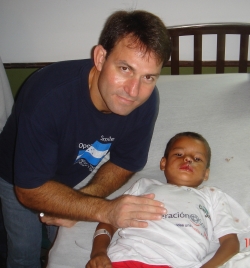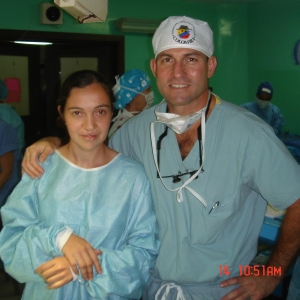Operation Smile from a Surgeon's Perspective: Dr. Paul Gardner
"In most of the places we go, people with birth defects are shunned by society," explained Dr. Paul Gardner. "Early on, they become reclusive; they don't get a chance to become normal kids."
Dr. Gardner, a plastic surgeon based in southwest Florida, has traveled to Central America, South America, and Asia on eight Operation Smile missions.

Operation Smile is an organization dedicated to correcting childhood facial deformities, mainly due to birth defects, around the globe. Since it was founded in 1982, more than 115,000 patients have been treated in 26 countries.
Gardner became involved in the organization twelve years ago. "I knew I always wanted to do some overseas medical work, and this was a great organization to get involved with," he said. "They are very organized, and they are very good at being efficient."
A Busy, Busy Schedule
From a surgeon's perspective, says Gardner, it is appealing to be involved with an organization that has such an extensive infrastructure. Therefore, no time is wasted once Operation Smile teams arrive in their mission locations. "You want to do the maximum amount of good in the minimum amount of time," he said.
And they do.

During a typical Operation Smile mission of 10-12 days, a team of volunteers, nurses, surgeons, and locals manage to screen hundreds of patients and perform 120-180 corrective surgeries.
News of coming Operation Smile teams is widely circulated throughout the mission country. As a result, potential patients travel for days, usually via school bus or train -- and occasionally by foot, horseback or mule -- to see the surgical team.
Hundreds of patients are screened, and a priority list, which ranks surgical candidates, is created by the team. "The priority list is fashioned in such a way that the things that we can do most efficiently are done first," Gardner explained. "We usually do [these surgeries] on the kids that are the youngest so that they have a shot at being normal early on in life," he said.
Not Just for Children
Because of the priority list, teams are rarely able to treat adults. However, one of Dr. Gardner's favorite memories from his mission to Vietnam is of a 26-year-old farmer from a remote village. This man knew that he did not make the priority list but still spent the entire week standing outside the hotel where the Operation Smile team was staying, trying to get a doctor to see him. The farmer told Gardner that the reason he wanted his deformity to be corrected so badly was because nobody in his village would kiss him -- he had never been kissed by a woman.
"So, on the last day of surgeries, after all of the priority patients had been treated, my wife [a nurse] and I decided to keep one of the operating rooms open and fix his deformity," Gardner recalled. "And he was so grateful," he said.
Global and Local
Recently, Gardner has taken his experience with Operation Smile and applied it to his own life in South Florida. In collaboration with the healthcare center he works from, Gardner has performed corrective surgery on two local children with facial deformities who would not have had the resources to pay for the surgery otherwise.
"We're looking to create an organization that helps local kids as well as kids overseas," he said.
About the Author
Kelly L. McCoy is a freelance medical writer based in Atlanta, GA.
About Angels in Medicine
Angels in Medicine is a volunteer site dedicated to the humanitarians, heroes, angels, and bodhisattvas of medicine. The site features physicians, nurses, physician assistants and other healthcare workers and volunteers who reach people without the resources or opportunities for quality care, such as teens, the poor, the incarcerated, the elderly, or those living in poor or war-torn regions. Read their stories at www.medangel.org.